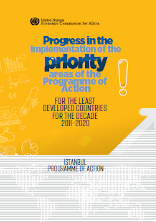Progress in the implementation of the priority areas of the Programme of Action for the Least Developed Countries for the decade 2011–2020

The least developed countries (LDCs) are those that face the most difficult obstacles to their ongoing effort towards inclusive growth and sustainable development. On the whole, African LDCs are making progress on the priority areas identified in the Programme of Action for the Least Developed Countries for the Decade 2011–2020 (Istanbul Programme of Action), albeit from very low baselines and with large variations throughout the countries. Productive capacity remains very low among LDCs in Africa and concerted efforts to improve value added per worker in all sectors are required to increase household earnings and promote inclusive and sustainable development. Notwithstanding the importance of trade in promoting growth, the share of exports from the African LDCs in world trade remained at approximately 0.6 per cent in 2017. The good news is that diversification has improved with the concentration index among LDCs, declining from 0.65 in 2008 to 0.36 in 2017. Human development in LDCs has improved (human development index was estimated at 0.473 in 2017, up from 0.440 in 2010), thanks to better education and health outcomes. Sustained improvements in this area are critical for inclusive growth and sustainable development.
Both human-caused and natural crises remain prevalent among the continent’s LDCs and risk derailing progress. Poverty rates, inequality, civil strife and political instability are prevalent, and the high rate of urbanization among LDCs makes cities and urban centres increasingly vulnerable to the impact of disasters. In response, many African countries in general are adopting and implementing national disaster strategies. The declining trends in foreign investment flows to African LDCs are concerning. Improving governance is critical towards mobilizing resources and realizing inclusive and sustainable development.
Lastly, although five African LDCs (Djibouti, Lesotho, Togo, the United Republic of Tanzania and Zambia) are approaching the graduation thresholds, there is uncertainty regarding how soon they can reach them. Efforts to diversify their economies (especially in the case of Zambia) and build their human assets must continue.